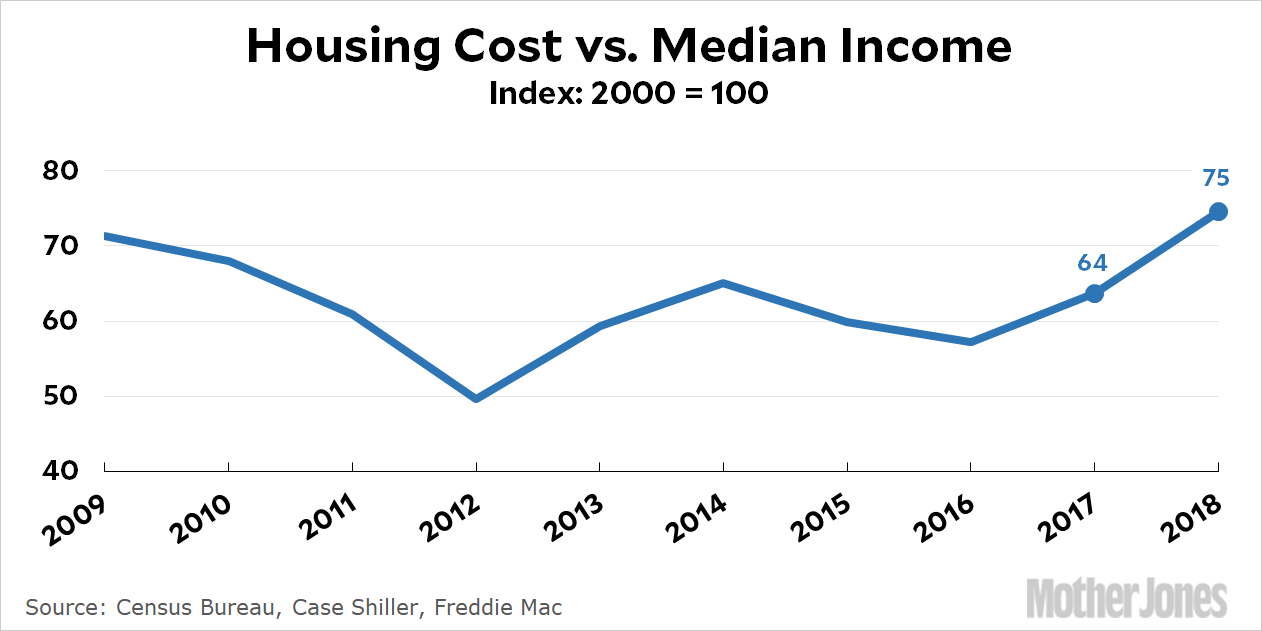Dean Baker notes that even though the economy is strong, people aren’t taking out new mortgages:
Mortgage applications have been falling all through the fall, they are now down 22 percent from year-ago levels, with purchase applications down 3 percent. This matters because if people aren’t taking out mortgages they are not buying homes. Residential construction has been a drag on GDP in the last three quarters. Also, when people buy a new home they typically buy appliances and other items associated with moving. This means less consumption spending as well.
That’s a big number. Off the top of my head, I can’t think of any other important economic indicator that’s down 22 percent over just the past year. In fact, I can’t think of anything that’s close. So what’s the problem? Here’s Neil Irwin:
When you look closely at the data, it appears this paradox of a strong economy and a weak housing market is, at its core, an illustration of a fundamental rule in economics: If something can’t go on forever, it won’t.
Home prices in a given location are ultimately tethered to the incomes of the people who either live there or want to. But for much of the last six years, that relationship has come undone. Nationally, personal income per capita has risen 25 percent since the end of 2011, while the S&P/Case-Shiller national home price index is up 48 percent (neither figure is adjusted for inflation). The gap is even larger in the big coastal cities with high wages and booming job markets, but where legal and other barriers make it hard for builders to add to the supply of homes. In the San Francisco metro area, per capita personal income rose 40 percent from 2011 to 2017, while home prices rose 96 percent. Similar patterns are evident in Los Angeles, Seattle, Boston, New York and Washington.
Irwin is right, except that the real disconnect has come over the past year. It’s true that housing prices went up relative to income starting in 2011, but they bounced up and down in about the same range as they had before. It was only in 2018 that they shot up above their recent level:

Note that this is an index of my own creation, so the numbers themselves don’t have any special meaning. The index merely takes the Case-Shiller housing index, multiplies it by the average 30-year fixed mortgage rate, and compares it to median household income. Then I normalize it to 100 for the year 2000. What it shows is that the effective cost of homebuying—when you account for both housing prices and interest rates—is about 17 percent higher than it was in 2017 even when you account for higher incomes. This makes sense since the downturn in mortgage applications started about a year ago, not in 2011.
There may be more to the story, but a 17 percent rise in house prices is enough to mostly explain a 22 percent decline in mortgage applications. This is especially true when you don’t have a bubble mentality driving homebuying, as we did when house prices were increasing in the mid-aughts.
So how important is the housing market to the broad economy? There’s no firm consensus on this, aside from the fact that a declining housing market isn’t good for the economy. Beyond that, the next year or two should tell us.


















